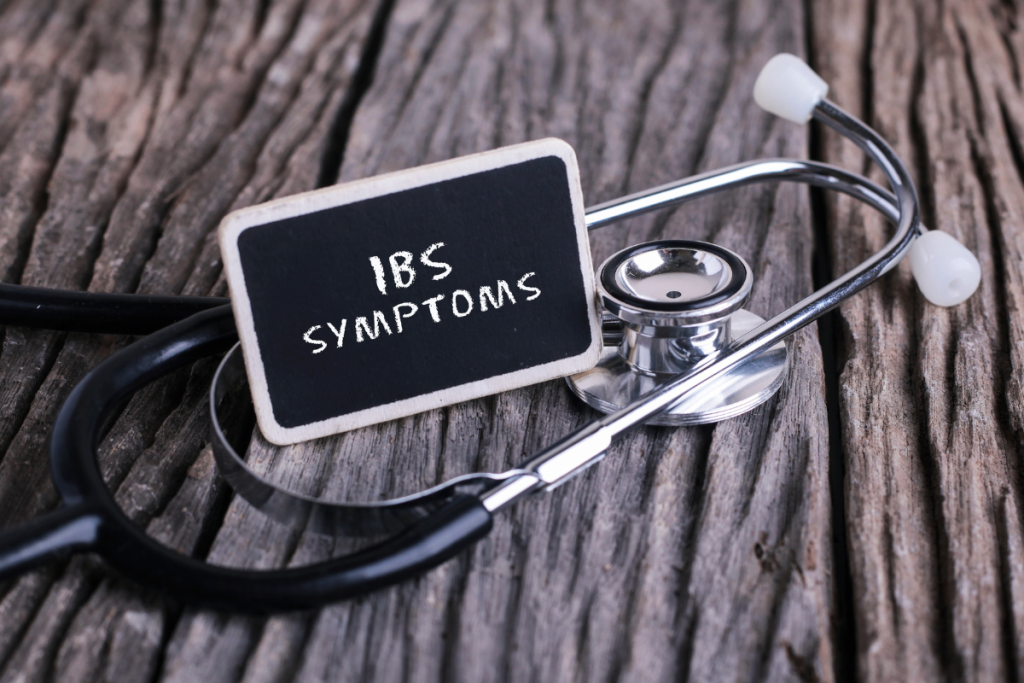Ever had those days when your stomach feels like it’s plotting a rebellion? I know I have. Call it a “nervous tummy” or my gut throwing a tantrum; it’s a feeling many of us are all too familiar with. And while it’s a bit of a chuckle when I say my stomach is doing somersaults before a big event, for many women, this is a daily reality, not just butterflies in their stomach but a condition known as irritable bowel syndrome (IBS).

Canada: A Hotspot for IBS, Especially Among Women
It’s a bit baffling, but did you know Canada has one of the highest rates of IBS in the world? And guess who bears the brunt of it? We do, ladies. Studies and my own practice show that when it comes to women and IBS, the diagnosis rates are significantly higher than for men. So, why us? Well, the jury’s still out, but factors like hormones and, let’s face it, our societal role as the ultimate multitaskers might be playing a part.
IBS 101: More Than Just a ‘Sensitive Stomach’
When discussing women and IBS, it’s crucial to understand that IBS isn’t just about having a sensitive stomach. It’s a complex syndrome with a range of symptoms, from constipation to diarrhea, and everything in between. The gut-brain axis – yes, that’s a thing – plays a crucial role here. Imagine your brain and gut in a constant chat, and when the communication lines get crossed, chaos ensues in your digestive system.

A Closer Look at IBS: Beyond the Basics
While occasional abdominal discomfort or changes in bowel habits are common for many, those navigating the world of irritable bowel syndrome (IBS) face these challenges on a whole different level. The intensity and frequency of symptoms like cramping, bloating, constipation, and diarrhea can significantly disrupt daily life, making IBS far more than just an occasional inconvenience.

The Sensitive Gut: Understanding IBS Symptoms
Individuals with IBS often describe their digestive system as particularly sensitive, reacting strongly to stimuli that might not affect others. This heightened sensitivity can lead to a range of symptoms, from urgent and frequent bowel movements to severe constipation, often accompanied by a sense of incomplete evacuation and immense relief when gas or stool is passed. It’s not uncommon for stool to be covered in mucus, adding to the discomfort and concern.
The unpredictability of symptoms, with their varying combinations and intensities, contributes to the anxiety many with IBS feel. The inconsistency in stool consistency, influenced by factors like stress, further complicates daily life. Recognizing the subtypes of IBS—IBS-D (diarrhea-predominant), IBS-C (constipation-predominant), and IBS-M (mixed)—helps in understanding and managing the condition more effectively.
Pain: The Unseen Companion of IBS
Pain in IBS can be as variable as the bowel symptoms themselves, ranging from ongoing discomfort to sharp, episodic pains that can shift locations rapidly. Often exacerbated by meals, this pain can linger for hours, with many reporting that their reaction to digestive discomfort is more acute than those without IBS. My conversations with those affected reveal a spectrum of pain experiences, from mild to severe, highlighting the personal nature of the condition.

Beyond Digestive Symptoms: The Wider Impact of IBS
IBS doesn’t limit its effects to the digestive system. Sleep disturbances, chronic pain conditions like fibromyalgia and back pain, and even mood disorders are more common among those with IBS. The condition can also affect intimacy, with some women reporting discomfort during sexual intercourse. These associated conditions underscore the complex interplay between physical and mental health in IBS.
The Ripple Effect of IBS on Daily Life
The impact of IBS extends into every facet of life, from work and education to social and personal activities. The need for readily available bathroom facilities can dictate one’s ability to participate in public life, while pain and discomfort may restrict even basic movements. The emotional toll, including feelings of anxiety, depression, and decreased self-esteem, further exacerbates the condition’s impact, making comprehensive care essential.

Navigating IBS: A Path Forward
Understanding the multifaceted nature of IBS symptoms and their impacts is the first step in managing the condition. From dietary adjustments and stress management techniques to open discussions with healthcare providers, there are strategies that can help. Remember, while IBS can be a challenging companion, it doesn’t have to define your life. With the right tools and support, you can manage your symptoms and reclaim your quality of life.
Triggers and Troubles: Navigating the IBS Minefield for Women
Identifying what sets off your IBS can be like walking through a minefield. For many women, stress is a major trigger; for others, it’s certain foods. And then there’s the hormonal rollercoaster that seems to have a direct line to our digestive system. The key for women dealing with IBS? Keeping a symptom diary and really tuning into your body’s signals.

Taking Control: From Diet Tweaks to Stress Busters
Managing IBS, especially for women, often starts with the basics: diet and stress management. Simple changes, like increasing hydration and incorporating probiotics, can make a world of difference. And never underestimate the power of stress reduction techniques. Meditation, yoga, or just deep breathing exercises can help calm both your mind and your gut.

Chatting with Your Doc: Opening the Conversation About Women and IBS
Talking about bowel movements isn’t exactly cocktail party chatter, but it’s a conversation you need to have with your doctor, especially for women with IBS. Being open and detailed about your symptoms can lead to better management strategies. And yes, there are medications and treatments specifically tailored for IBS that can be game changers for women.

Your Go-To Source: Care to Know
In the age of information overload, where Dr. Google often leads us astray, it’s crucial to have a reliable source, particularly for women dealing with IBS. That’s where Care to Know steps in. It’s not just another website; it’s a treasure trove of credible, science-backed information, curated by experts like me, focusing on women and IBS among other topics. So, before you fall down the internet rabbit hole, register for your free subscription to Care to Know. It’s your first step towards taking control of your IBS and not letting it control you.

You’re Not Alone
Remember, if you’re battling IBS, you’re not alone. It’s a condition that affects many of us, especially women. But with the right information, support, and management strategies, you can navigate this challenge and keep your gut in check. And always remember, your health is worth speaking up for, even if it’s about something as mundane as your bowel movements.

Dr. Christine Palmay is a family physician practising in Mid-town Toronto and a regular contributor to Caretoknow.ca and What She Said.